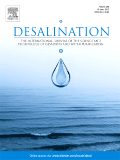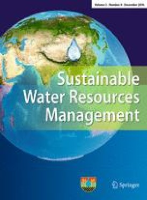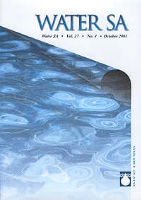
DESALINATION
Scope & Guideline
Advancing sustainable solutions for global water challenges.
Introduction
Aims and Scopes
- Desalination Technologies:
The journal extensively covers various desalination methods such as reverse osmosis, membrane distillation, forward osmosis, and capacitive deionization, exploring their efficiencies, advancements, and applications. - Water Quality Improvement:
Research articles focus on enhancing water quality through innovative filtration and treatment technologies, addressing issues such as membrane fouling, scaling, and biofouling. - Resource Recovery:
The journal emphasizes the recovery of valuable resources from desalination brines and wastewater, including lithium and other critical minerals, highlighting sustainable practices. - Energy Efficiency:
Studies on optimizing energy consumption in desalination processes are prevalent, with a focus on integrating renewable energy sources and improving operational efficiencies. - Environmental Impact Assessments:
Research on the environmental implications of desalination technologies, including life cycle assessments and impacts on ecosystems, is a significant area of focus. - Innovative Materials and Membrane Technologies:
The development and application of novel materials for membrane fabrication, including nanomaterials and hybrid structures, are central to the journal's scope. - Modeling and Simulation:
The journal includes theoretical and computational studies that model desalination processes, helping to predict performance and optimize designs.
Trending and Emerging
- Advanced Hybrid Systems:
There is a growing focus on hybrid desalination systems that combine multiple technologies, such as integrating reverse osmosis with forward osmosis or membrane distillation, to enhance efficiency and resource recovery. - Nanomaterial Integration:
The use of nanomaterials in membrane fabrication and treatment processes is trending, with research focusing on their potential to improve performance, reduce fouling, and enhance durability. - Sustainable Resource Recovery:
Emerging research emphasizes the sustainable recovery of valuable resources from brine and wastewater, particularly lithium and other critical minerals, in line with circular economy principles. - Machine Learning and AI Applications:
The application of machine learning and AI for optimizing desalination processes and predicting performance outcomes is gaining traction, reflecting a shift towards data-driven approaches. - Environmental Sustainability Assessments:
An increasing number of studies are focusing on the environmental impacts of desalination processes, including life cycle assessments and ecological effects, as sustainability becomes a central concern. - Smart and Autonomous Systems:
The trend towards smart desalination technologies, including remote monitoring and automation, is becoming more prominent, addressing the need for efficient and responsive water management solutions. - Thermal and Phase Change Materials:
Research into thermal desalination processes and the use of phase change materials for energy efficiency improvements is on the rise, reflecting a renewed interest in thermally-driven technologies.
Declining or Waning
- Traditional Methods of Desalination:
There has been a noticeable decrease in research focused on conventional desalination methods without innovative enhancements, as the field shifts towards more advanced and efficient technologies. - Single-Focus Studies on Membrane Types:
Research that concentrates solely on specific types of membranes without addressing broader applications or integrations has become less common, as the focus has shifted to multifunctional and hybrid systems. - Static Analysis of Desalination Systems:
The trend is moving away from static analyses of desalination systems towards dynamic, real-time modeling and optimization, reflecting a need for more adaptive and efficient solutions. - Basic Water Treatment Techniques:
Basic water treatment methods that do not integrate advanced technologies or novel materials are featured less frequently, as the field progresses towards more complex and innovative solutions.
Similar Journals

Environmental Science-Water Research & Technology
Pioneering advancements in environmental water solutions.Environmental Science-Water Research & Technology is a premier journal published by the Royal Society of Chemistry that focuses on the latest research and technological advancements in the field of water science and engineering. Since its inception in 2015, the journal has steadily gained recognition for its rigorous peer-review process and commitment to advancing our understanding of fresh, wastewater treatment, and sustainable water management. With a remarkable 2023 impact factor and consistently achieving Q1 status in both Environmental Engineering and Water Science and Technology categories, this journal ranks within the top percentile of its field, underscoring its pivotal role in fostering innovative solutions to global water challenges. Currently listed as Rank #26/261 in Water Science and Technology and Rank #34/197 in Environmental Engineering by Scopus, it provides an essential platform for researchers, professionals, and students alike. The journal embraces a broad spectrum of topics concerning water research, aiming to bridge the gap between scientific understanding and practical application.

Membrane and Water Treatment
Exploring Advanced Membrane Technologies for Clean WaterMembrane and Water Treatment is a prominent academic journal published by TECHNO-PRESS, dedicated to the fields of chemical engineering and water science. With an ISSN of 2005-8624 and E-ISSN 2092-7037, this journal aims to disseminate innovative research and technological advancements related to membrane technologies and water treatment processes. Since its inception in 2010, it has steadily contributed to the body of knowledge, achieving a Q3 ranking in Chemical Engineering and a Q4 ranking in Water Science and Technology as of 2023. Positioned within the 35th percentile of its respective categories in Scopus, it serves as a critically accessed platform for researchers and professionals eager to explore cutting-edge methodologies and solutions to water management challenges. Based in South Korea, Membrane and Water Treatment is committed to providing a scholarly environment where interdisciplinary and collaborative research can flourish, ensuring that readers remain at the forefront of developments in this essential field.

NATION
Innovating research for a deeper understanding of our world.NATION is a prestigious and influential journal that has been serving the field of Social Sciences and Cultural Studies since its inception. Published by NATION CO INC, this journal offers a platform for innovative research and critical discourse, empowering scholars to explore the complexities of culture, politics, and society. Although currently not an open-access publication, NATION remains a significant resource for researchers and practitioners aiming to stay abreast of the latest developments in the field. With a history of converging years of publication and a notable ranking of #796 out of 1002 in the Scopus Social Sciences_Cultural Studies category—with a percentile of 20%—the journal's contributions continue to play a vital role in academic discussions and cultural critiques. The editorial office is located at 33 Irving Place, 8th Floor, New York, NY 10003, facilitating a dynamic interaction between contributors and the editorial team. By engaging with this journal, academics and professionals can enrich their understanding of crucial cultural phenomena.

Water Conservation Science and Engineering
Pioneering Research in Water Science and EngineeringWater Conservation Science and Engineering, published by SPRINGERNATURE, is a vital academic journal dedicated to advancing the fields of environmental engineering, ocean engineering, waste management, and water science and technology. Since its inception in 2016, the journal has quickly established itself within the academic community, achieving a commendable Q3 ranking across multiple categories in 2023. With an ISSN of 2366-3340 and an E-ISSN of 2364-5687, it is accessible to a global readership eager to explore the latest research and innovations in water conservation and sustainable practices. Although currently not open access, the journal is committed to publishing high-quality scholarly articles that provide insights into effective water management strategies, innovative engineering solutions, and the critical importance of preserving our water resources. Based in Singapore, Water Conservation Science and Engineering aims to foster interdisciplinary collaboration among researchers, professionals, and students, making it an essential resource for anyone passionate about environmental sustainability and preservation.

Sustainable Water Resources Management
Pioneering research for a water-secure future.Sustainable Water Resources Management is an esteemed journal focusing on the critical field of water resource management in the context of sustainability. Published by Springer International Publishing AG, this journal serves as a vital platform for researchers, policymakers, and practitioners to disseminate cutting-edge research and innovative practices aimed at addressing global water challenges. With an impressive impact factor aligned with its Q2 ranking in Water Science and Technology and Q3 in Renewable Energy, Sustainability, and the Environment, it maintains a robust reputation in its field, evidenced by its Scopus rankings. Covering a diverse range of topics from integrated water resource management to the nexus between water and energy, Sustainable Water Resources Management is committed to fostering knowledge exchange and encouraging interdisciplinary dialogue among its audience. This journal, operating under strict academic rigor, plays an essential role in advancing sustainable practices and is open from 2015 to 2024, making it a relevant resource in today’s rapidly evolving environmental context.

CHEMICAL AND PETROLEUM ENGINEERING
Connecting Scholars in Chemical and Petroleum EngineeringChemical and Petroleum Engineering is a prestigious academic journal dedicated to the advancement of knowledge in the fields of chemical engineering and petroleum technologies. Published by Springer, this journal serves as a vital resource for researchers, professionals, and students interested in the intricate processes and innovations that drive these industries. With an ISSN of 0009-2355 and an E-ISSN of 1573-8329, it has established a notable presence since its inception in 1965. Throughout its converged years, the journal has continually published impactful research that contributes to sustainability and efficiency within the sectors. Although it holds a Q3 ranking in Chemical Engineering and Fuel Technology and a Q4 ranking in Energy Engineering and Geochemistry, it is a noteworthy platform for emerging studies, fostering connections among scholars. Readers will find a wealth of information and ideas, but please note that this journal does not currently offer open access options. For those passionate about chemical and petroleum engineering, this journal is an essential part of staying informed and engaged with the latest scientific advancements.

ENVIRONMENTAL ENGINEERING SCIENCE
Leading the charge in pollution control and waste management.ENVIRONMENTAL ENGINEERING SCIENCE is a leading journal published by MARY ANN LIEBERT, INC that provides a platform for pioneering research in the fields of environmental chemistry, pollution control, and waste management. With an ISSN of 1092-8758 and an E-ISSN of 1557-9018, this peer-reviewed journal aims to disseminate high-quality scientific studies that address critical environmental challenges. As evidenced by its 2023 category quartile rankings, it holds a notable position at Q3 in Environmental Chemistry and Pollution and Q2 in Waste Management and Disposal, highlighting its relevance and impact in these domains. Spanning over two decades from 1997 to 2024, the journal is dedicated to fostering innovations and promoting rigorous scholarship that can contribute significantly to sustainable environmental practices globally. Authors and researchers are encouraged to engage with this essential resource, which offers Open Access options to enhance the visibility and reach of their work. For those interested in advancing their understanding and practice within the environmental sciences, ENVIRONMENTAL ENGINEERING SCIENCE is an indispensable journal to consider.

WATER SA
Connecting research and innovation in water management.WATER SA, published by the WATER RESEARCH COMMISSION, serves as a pivotal platform for interdisciplinary research in the areas of water science and technology. With an ISSN of 0378-4738 and an E-ISSN of 1816-7950, this open-access journal has been committed to disseminating knowledge since 2005, ensuring that research is freely accessible to a global audience. As of 2023, it holds a Q3 ranking in several key categories including Applied Microbiology and Biotechnology, Management, Monitoring, Policy and Law, Waste Management and Disposal, and Water Science and Technology. These rankings reflect its significant contribution to these disciplines, particularly in South Africa where it is based. With a history dating back to 1976 and converging research efforts extending through 2024, WATER SA aims to illuminate pressing water-related challenges and foster innovative solutions through rigorous scientific inquiry. Researchers, professionals, and students interested in the sustainability and management of water resources will find its comprehensive portfolio essential for advancing their work and understanding in an increasingly critical field.

Water
Fostering interdisciplinary research on global water challenges.Water, an esteemed journal published by MDPI, serves as a pivotal resource for global research in the fields of aquatic science, biochemistry, geography, and water science and technology. Since its inception in 2009, this open-access journal has committed itself to advancing knowledge regarding water-related topics by fostering a platform that encourages the dissemination of high-quality research. With its impressive impact factor reflecting its relevance and influence, Water ranks in the top quartiles in various categories, including Q1 in Aquatic Science and Water Science and Technology, showcasing its commitment to publishing cutting-edge findings that resonate deeply with the environmental and biological sciences community. Located in Basel, Switzerland, the journal prioritizes accessibility for researchers, professionals, and students alike, aligning with the broader scientific goal of addressing urgent water challenges through collaborative and interdisciplinary research.

SEPARATION AND PURIFICATION TECHNOLOGY
Elevating standards in separation and purification research.SEPARATION AND PURIFICATION TECHNOLOGY is a leading multidisciplinary journal published by Elsevier, focused on advancing the fields of Analytical Chemistry and Filtration and Separation. With its ISSN 1383-5866 and E-ISSN 1873-3794, this prestigious journal has achieved remarkable recognition, ranking in the top quartile (Q1) in both its categories, reflecting its substantial impact and relevance in the scientific community. Operating from its headquarters in Amsterdam, Netherlands, SEPARATION AND PURIFICATION TECHNOLOGY serves as a vital platform for researchers, professionals, and students to disseminate innovative findings and methodologies related to separation processes and purification techniques. The journal not only promotes open access research but also maintains a rigorous peer-review process to ensure high-quality publications. With a convergence period spanning from 1997 to 2025, it highlights the ongoing evolution and importance of separation technology in various applications, establishing it as an essential resource for those interested in cutting-edge advancements in analytical and chemical engineering domains.